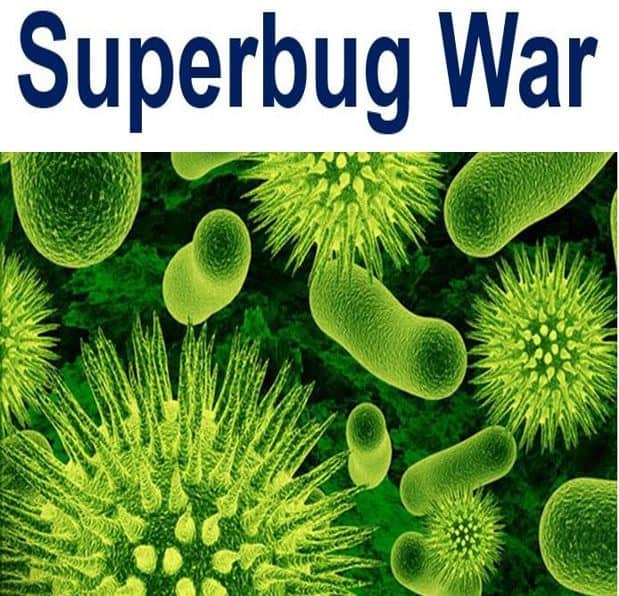Unless we spend millions every year globally in an internationally-coordinated strategy, we will lose the war against superbugs, says a new UK commissioned government report. Countries worldwide need to get together and develop a plan.
Superbugs are strains of bacteria that have become resistant to antibiotics, i.e. there are no effective drugs to treat patients infected with them.
Pharmaceutical companies are being urged to contribute towards a $2 billion antibiotic research fund to boost research, which appears to be losing the battle against the global spread of resistant bacteria.

If we do not take the antibiotic-resistance problem seriously, it won’t be long before doctors refuse to carry out routine surgical operations because the risk of an infection killing the patient would be too great.
In return, the pharma industry would receive guaranteed payments, that is of course, companies that produced urgently needed new antibiotics.
UK Prime Minister David Cameron said regarding the antibiotic resistance threat:
“If we fail to act, we are looking at an almost unthinkable scenario where antibiotics no longer work and we are cast back into the dark ages of medicine.”
A report commissioned by the UK Government said large drug makers should be awarded incentives of up to £24 billion to try to develop a new generation of antibiotics.
International effort required
According to Jim O’Niel, ex-Chairman of Goldman Sachs Asset Management, who chaired the report, taxpayers globally should be asked to put up much of the money over the next decade.
Mr. O’Neill was appointed by David Cameron to address the growing threat of antibiotic resistance.
Mr. O’Neil pointed out that the research awards would cost less than 20% of the costs of dealing with the antibiotic resistance just in the United States. Companies should be rewarded for investing in antibiotics R&D (research and development).
Drug makers today make tiny returns on antibiotic R&D investments, and need to sell them in huge quantities, which contributes to the spread of antibiotic resistance.
Mr O’Neill said:
“We need to kick-start drug development to make sure the world has the drugs it needs, to treat infections and to enable modern medicine and surgery to continue as we know it.”
Mr. O’Neill has long been warning about the massive and growing threat of resistant bacteria. He had previously estimated that drug-resistant microbes could be killing about 10 million people annually worldwide by the middle of this century, as well as (by this date) costing global economic output $100 trillion. The cost would be the equivalent of losing losing the output of the British economy every year for 35 years.
In an interview with Sky News, Mr. O’Neill said:
“Compared to what has been going on for the last 20 years or so – 15 new, really effective antibiotics would be a huge positive development.”
“It would not solve the problem on its own – there is a big issue with our demand for these things – but it would solve this core fear that over next 20 to 30 years we are going to run out of antibiotics.”
It has been several decades since a new class of antibiotics has been developed. The ‘pipeline’ of new antibiotics is alarmingly empty. The majority of pharmaceutical companies no longer invest in antibiotics R&D.
Dame Sally Davies, England’s chief medical officer, said:
“This latest report will stimulate important conversations between governments, pharmaceutical companies and other funders. We have to respond to the challenge of AMR by making sure we secure the necessary antibiotics for generations to come, in order to save millions of lives and billions of pounds.”
Mr. O’Neill added that decisive action is urgently required to change the way antibiotics are currently used and misused in humans, animals and the wider environment.
During the course of this year, the Review will publish further papers, focusing on the critical issues that contribute to this problem, including the use of antibiotics in farming, the possibility of using new technologies to improve how doctors prescribe, and the scope for replacing some of our current antibiotics usage with other ways to fight infections, such as vaccines and new therapeutic approaches.
Dr. Manica Balasegaram, Executive Director, Access Campaign, Médecins Sans Frontières, said:
“This timely report highlights the fact that we have major gaps in needs-driven R&D that affect rich and poor countries alike.”
“Bold interventions such as de-linkage- a measure that uncouples profitability from volume of sales – are urgently needed in order to promote innovation, access and conservation of antimicrobials. A global innovation fund for AMR and key infectious diseases would also be catalytic in changing the landscape.”
Patrick Vallance, President of Pharmaceuticals R&D at British pharmaceutical giant GlaxoSmithkline, said said we urgently need to find new ways to increase R&D in antibiotics and create a new pipeline of new treatments.
Dr. Vallance, who described antibiotic resistance as a massively complex problem, warned that it could have potentially devastating consequences for public health.
Commenting on the report, Dr. Vallance said:
“As one of the few companies still conducting research in this area, we welcome today’s report. We are very encouraged by the ideas it sets out to modernise the economic model to encourage investment in research and ensure reasonable returns for successful innovation while discouraging unnecessary use of new antibiotics.”
“We look forward to working closely with the AMR Review Team and others to take these ideas forward.”
Citation: “Review on Antimicrobial Resistance,” Chair, Jim O’Neill.
